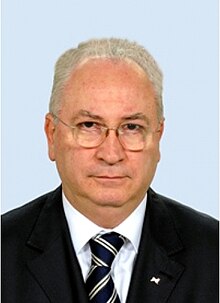Puiu Hașotti
Puiu Haşotti | |
|---|---|
 | |
| Member of the Chamber of Deputies of Romania | |
| In office 22 Nov 1996 - 10 Dec 2000 11 Dec 2000 – 11 Dec 2004 | |
| Constituency | no. 14 (Constanţa) |
| Senator of Romania | |
| Assumed office 13 Dec 2004 - 12 Dec 2008 15 Dec 2008 | |
| Constituency | no. 14 (Constanţa) |
| Leader of the National Liberal Party group in the Senate | |
| Assumed office 4 April 2007 | |
| Constituency | no. 14 (Constanţa) |
| Minister of Culture | |
| In office 25 June 2012 – 21 December 2012 | |
| President | Traian Basescu |
| Prime Minister | Victor Ponta |
| Preceded by | Mircea Diaconu |
| Succeeded by | Daniel Barbu |
| Personal details | |
| Born | 14 June 1953 |
| Political party | National Liberal Party |
Puiu Haşotti (Romanian pronunciation: [ˈpuju ˈhaʃoti]; born 14 June 1953) is a Romanian politician. He is a vice-president of the National Liberal Party and the leader of the party's group in the Senate.
In April 2013, Haşotti incited controversy by declaring that he considers gay people to be "sick people". He also said that, "Homosexuality is not a normal state, it is not a natural relationship". The comments were made in the context of political debate about same-sex civil unions in Romania. Accept, Romania's national LGBT rights organisation, stated that they believed Haşotti's comments were a breach of anti-discrimination law and would report him to the National Council for Combating Discrimination.[1]
Early Life and education
Puiu Haşotti was born on June 14, 1953 in Constanta, and graduated from the Faculty of History, University of Bucharest in 1976. He received his doctorate in historical sciences in 1995. The year before he was a Fulbright Fellow at San Francisco State University. Before entering politics, Haşotti worked as a curator, principal curator and then senior researcher (1976 - 1996). He also was a counselor at Constanta County Inspectorate for Culture (1990 - 1995), and a lecturer at the University Ovidius Constanta, Faculty of History (1990 - 1996). He later gained an associate professorship at this institution, which he still holds.[2]
References
- Puiu Haşotti Senate page
- Puiu Hasotti PNL about reglementing civil partnership between same sex -homosexuals are just some sick people, homosexuality is not a normal state.
- Biography
